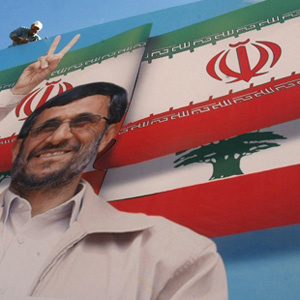Iran and Saudi Arabia: Rivals in the Region, Partners in Lebanon

 IRD: Iran-Saudi Arabia relations show no signs of improvement. Can Ahmadinejad’s recent visit to Lebanon and his phone conversations with King Abdullah of Saudi Arabia help ease the tension?
IRD: Iran-Saudi Arabia relations show no signs of improvement. Can Ahmadinejad’s recent visit to Lebanon and his phone conversations with King Abdullah of Saudi Arabia help ease the tension?HR: Sure. Ahmadinejad’s talk with King Abdullah, both before and after his visit, were soothing for the region. Saudi Arabia sees itself engaged in a zero-sum regional competition with Iran. However, the quality of Ahmadinejad’s visit to Lebanon and his meeting with all Lebanese factions proved that Iran prefers a stable, balanced Lebanon—one that won’t be a threat to Saudi interests.
IRD: Ahmadinejad has reportedly put forward proposals for the return of stability to Lebanon and the Middle East. Can his plans be of any help?
HR: Rafik Hariri’s international tribunal is the basic cause of chaos in Lebanon. Hariri’s al-Mustaqbal movement and the way he reacts to the tribunal is the key to stability in Beirut. This tribunal is infected by politics: powerful accusations against Syria were later retracted, witnesses proved to be false, and Lebanese officers accused of complicity were acquitted. The tribunal is clearly a Western tool. If the Lebanese solve the complexities of the saga of the late Rafik Hariri’s assassination, Lebanon will see better days.
IRD: You spoke of Syria. Is Damascus’ Lebanon policy in accord with Iran? Or does Syria prefer to act as an independent actor?
HR: Iran and Syria are close political allies, so they naturally have similar attitudes toward the tribunal. But there’s no need for Tehran’s support for Damascus in this case, even though 33 Syrian officials have been subpoenaed to Hariri’s tribunal.
IRD: There have been talks about a four-way Riyadh-Tehran-Damascus-Beirut committee to help improve the situation in Lebanon. Can Beirut and Riyadh cooperate with Iran when they have political problems?
HR: It will be truly difficult. Iran and Syria can be good partners, but Saudi Arabia backs the tribunal’s procedure. The four countries may be able to agree on a mechanism which brings peace to Lebanon, but it’s truly hard to convince them to work toward further goals.
IRD: On the one hand we see that the West is trying to pressure Iran through sanctions and cut off its long arms –Hezbollah, Hamas and other Islamist organizations- and on the other, Iran is invited to a committee to manage Lebanon’s affairs. What is the final output of these developments? A weaker or stronger Iran?
HR: The invitation of Iran to such committees is an admission of its power. Iran has the strongest say in Iraq and Lebanon, and is an influential actor in Palestine. Don’t doubt that Iran would not be invited to any of the regional cooperation bodies if it was an ordinary state. Despite all the efforts to isolate Iran, its enemies and rivals begrudgingly admit its power and invite it to cooperate.

